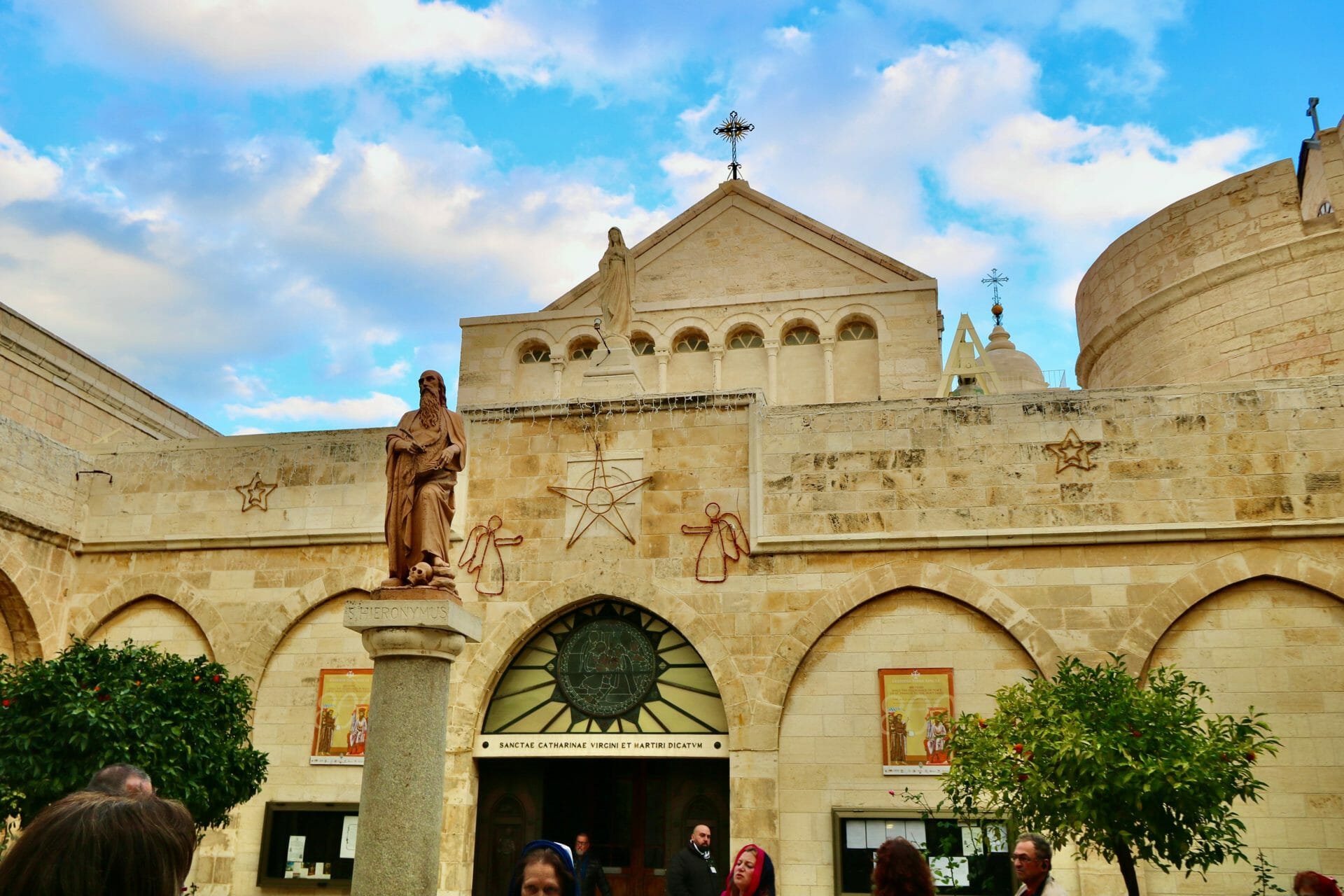
The Church of the Nativity in Bethlehem, Palestine.
Photo by Jorge Fernández Salas on Unsplash
Bethlehem: metaphor for a complicated mess
For a number of reasons, I have an affinity for the author of the Christmas carol “O Little Town of Bethlehem,” Phillips Brooks. For one, he served as rector of a church in my hometown of Philadelphia, and later of Trinity Church in Boston, near where I live now. But there is another connection. Phillips Brooks was the great-great-grandson of Samuel Phillips, Sr. That Phillips was the first pastor of the church from which I retired. He was the first. After 300 years, I was the seventeenth. His son, Samuel Phillips, Jr. started a school up the street from the church which bears his name – Phillips Academy. On that campus was also founded the Baptist school for the training of ministers and missionaries known as Andover Theological Seminary, whose graduates include Adoniram Judson, one of America’s first missionaries abroad and after whom Judson Press is named. I am also proud to be a Judson Press author. So, when I sing “O Little Town of Bethlehem,” I feel multiple connections to its author.
The star pointed to the Prince of Peace born in a manger in Bethlehem. Bethlehem was the epicenter of God’s attention when God sent his son, and in that town, the Word became flesh (John 1:14). Today, Bethlehem is a Palestinian city located in the central West Bank, about six miles south of Jerusalem. It is the capital of the Bethlehem Governorate of the Palestinian National Authority and a hub of Palestinian culture. It is still an epicenter, and it glows white hot as some of the tensest real estate on our planet. I worked at a Quaker college where a faculty colleague, returning from a behind-the-scenes peacemaking mission to the Middle East, told me that he thought the conflict between Israel and Palestine was so deeply rooted and complicated a mess that he had no hope that it could ever be resolved. The news never stops reporting about how many Palestinians or Israelis are killed that day. Not only is Bethlehem violent, conflicted real estate, but real estate seems to be at the root of the conflict.
This Christmas when I sing “O Little Town of Bethlehem,” I’m going to be thinking of the song and the town as a metaphor for seemingly unsolvable situations in my life and in the lives of people I know and care about.
When I recall my Quaker colleague’s comment about Bethlehem being at the center of a complicated mess with no resolve in sight, it seems to me that Bethlehem is a metaphor. Bethlehem is a metaphor for complicated messes which seem hopeless. Sometimes we have Bethlehems in our family. I have one. Sometimes we have Bethlehems in our jobs, with our health, our finances, or with a problem that just does not seem solvable. We have Bethlehems with our schools, our churches, our politics, with economics that favor some over others, with immigration of those seeking safety and hope within our borders, with racism, sexism, and with the growing threat of climate change. Martin Luther King drew on generations of African-American tradition when he wrote that God “is able to make a way out of no way.” Bethlehems seem to contradict that hopefulness with an apparent reality that there is, well, no way out.
This Christmas when I sing “O Little Town of Bethlehem,” I’m going to be thinking of the song and the town as a metaphor for seemingly unsolvable situations in my life and in the lives of people I know and care about. In that context, I resolve to find new meaning in the words penned by Phillips Brooks…
“The hopes and fears of all the years
are met in thee tonight.”
Our Bethlehems contain both hopes and fears… fears that the worst may happen and hope that the best is yet to come. British author G. K. Chesterton hit the nail on its head when he wrote “Hope means hoping when things are hopeless, or it is no virtue at all…” To paraphrase, it is in our Bethlehems that hope is a strength.
“O morning stars, together
proclaim the holy birth!”
Interestingly, the stars do indeed sing together. Consider how God told Job about the creation, adding “when the morning stars sang together and all the heavenly beings shouted for joy?” (Job 38:7). This is fascinating, because scientists have found that each star emits a radio signal that identifies it from all other stars. It is like the stars really do sing! God is Lord of the earth and also Lord of the Universe. Interestingly, when the Bible speaks of God so loving the world (John 3:16), the Greek word for world is cosmos. For God so loved the cosmos. God is Lord of the Universe with all of its mighty explosion, change, infinity, and creativity. The earth is the Lord’s, the stars sing together, and the entire universe groans in travail to proclaim Jesus’ holy birth. Even in the midst of our Bethlehems, we do well to remember that our day and our universe is God’s, and God is in control.
“Where meek souls will receive him still
the dear Christ enters in.”
Meek souls. That is sufficient. Oh, how we make our religion more complicated than it needs to be. Perhaps one of Jesus’ greatest teachings affirms how it is a simple faith which pleases God, and encourages us to become like children. In the Gospel of Mark Jesus taught “Let the little children come to me; do not stop them; for it is to such as these that the kingdom of God belongs” (Mark 10:14). Become like children. Faithfulness is what God wants most from you. If you think the Bible is a matter of rules, regulations, thou-shalt-nots, or self-sacrifice, then consider again. What God wants is for you to be God’s faithful child: to love, to trust, to obey, and to follow. A faithful child desires to be in the parent’s presence, and to be in touch with the parent. That is why Jesus asked his followers to become like children. Never forget, God does not call you to be successful. God calls you to be faithful. It is to the meek soul that the dear Christ enters in.
“O come to us, abide with us,
our Lord Emmanuel.”
The name Emmanuel means “God is with us.” This part of the song brings to mind five of the most important words in the Bible: “For Thou art with me.” (Psalm 23:4 KJV). These were Jesus’ final words on earth: “And remember, I am with you always, to the end of the age.” (Matthew 28:20). It is in our Bethlehem times that we want to know… is God with me? The words spoken in Isaiah could just as easily be God’s word to you: “Do not fear, for I am with you, do not be afraid, for I am your God; I will strengthen you, I will help you, I will uphold you with my victorious right hand.” (Isaiah 41:10). With you. That is the meaning of Jesus’ name: Emmanuel. God is with you. And so, it is our prayer and our song at Christmas to welcome him, to receive him to enter in, and to invite him to “come to us, abide with us, our Lord Emmanuel.” Even in our complicated Bethlehems and seemingly unresolvable messes, God is with us.
The views expressed are those of the author and not necessarily those of American Baptist Home Mission Societies.



